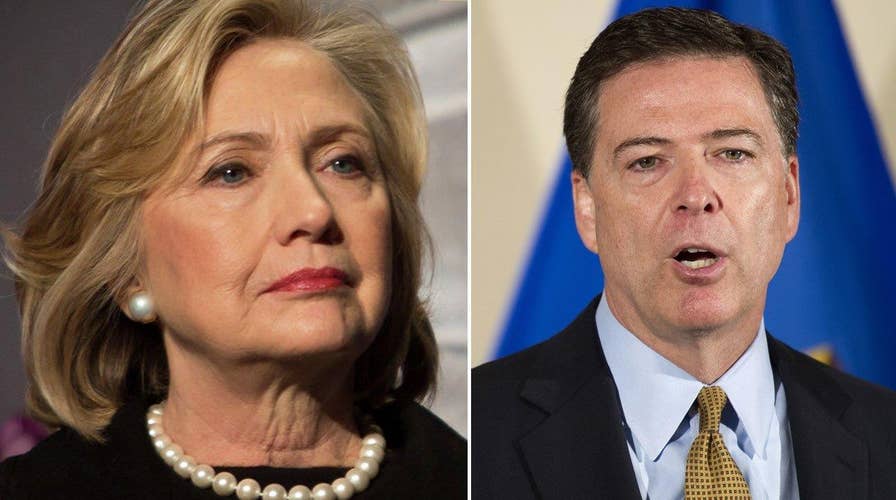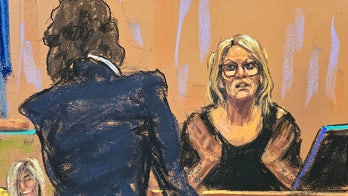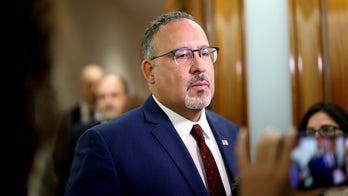What did Comey's testimony reveal about Clinton probe?
Reaction from the 'Special Report' All-Star panel
“There is nothing new under the sun. But there are lots of old things we don't know.” – Ambrose Bierce
We’ve seen this all before. Everyone is apoplectic about how crazy the presidential campaign is. How crazy the congressional campaigns are. And then the dramatic FBI email news just days before the election.
Did you hear about Mike Pence’s plane sliding off the runway at LaGuardia? Can you believe it? What would have happened if…
Chill.
In an election year, October is always full of surprises.
This isn’t new. This zany stuff always unfolds in October just as the election cycle crescendos.
Let’s start with the Pence plane mishap…
Late-House Majority Leader Hale Boggs, D-La., and Rep. Nick Begich, D-Alaska, perished in a plane crash October 16, 1972. Nobody has ever found the plane after it lifted off from a socked-in Anchorage International Airport into turbulent skies. Boggs was in Alaska to help the freshman congressman campaign just before the election.
Also on October 16 -- but 28 years later in 2000 -- Missouri Democratic Gov. Mel Carnahan died in a Cessna that went down near St. Louis. Carnahan was running against then-Sen. John Ashcroft, R-Mo.
Missouri law prevented officials from striking Carnahan’s name from the ballot. Carnahan still defeated Ashcroft posthumously by 2 percentage points. Missouri’s new governor then appointed Carnahan’s wife, Jean, to the Senate where she served until losing to former Sen. Jim Talent, a Republican, in a 2002 special election.
Two years later, on October 25, 2002, Sen. Paul Wellstone, D-Minn., barnstormed the state in his campaign against former Sen. Norm Coleman, a Republican. Wellstone died when the Beechcraft King Air A100 in which he was flying crashed in northern Minnesota. Then-Minnesota Gov. Jesse Ventura, an Independent, appointed Sen. Dean Barkley, also an Independent, to serve the rest of Wellstone’s term.
Democrats scrambling to find a replacement for Wellstone on the ballot tapped former Democratic Vice President and former Sen. Walter Mondale. Coleman defeated Mondale a few days later.
The term “October Surprise” entered the American political vernacular in 1964. That’s when Washington, D.C., police picked up a top aide to President Lyndon Johnson on “morals” charges after an incident in a YMCA locker room.
Aide Walter Jenkins had worked with Johnson in the House dating back to the late-1930s, followed him to the Senate, the Kennedy administration, then the White House.
Johnson thought his longtime aide was facing blackmail and that this could portend a “dirty trick” just before the election. The president got FBI Director J. Edgar Hoover on the phone immediately (remember the part about the FBI supposedly being above the fray just before elections we’ve been hearing so much over the past few days?) to order an investigation.
The president was just weeks away from facing Sen. Barry Goldwater, R-Arizona, at the polls.
Goldwater had long been talking about Texas cronyism and questions of ethics surrounding Lone Star State political operatives tied to Johnson. Goldwater’s campaign printed bumper stickers declaring “All the Way with LBJ, but Don’t Go Near the YMCA.”
In the New York Times, columnist James Reston wrote that the Jenkins bust “revived and dramatized all the harsh feelings about morals, and political cliques, and the Texas gang in Washington.”
Sound familiar?
“October Surprise” conspiracy theories only flourished after Jenkins’s arrest.
In October, 1968, rumors abounded that Johnson might craft a last-minute deal to halt the Vietnam War. Such an effort could vault Johnson’s Vice President and Democratic nominee Hubert Humphrey to the presidency over GOP nominee Richard Nixon.
It was thought that President Carter might engineer a special deal with Iran in October, 1980, to trigger the release of American hostages held in Tehran.
Of course, the converse theory was that the campaign of GOP nominee Ronald Reagan forged a pact for Tehran to hold the hostages through the election to make Carter appear weak.
Iran freed the hostages on Reagan’s inauguration day in 1981.
Four days before the 1992 presidential election, the feds indicted former Reagan Defense Secretary Caspar Weinberger over the Iran-Contra affair.
This fueled speculation that then-President George. H.W. Bush knew something about the arms-for-hostages agreement. Republicans found the timing dubious. They charged this was an effort by Independent Counsel Lawrence Walsh to defeat Bush.
President Bill Clinton then vanquished Bush with Ross Perot placing third.
Bush pardoned Weinberger in the final days of his presidency.
We haven’t even talked about the election dispute in Florida in 2000 between President George W. Bush, a Republican, and Vice President Al Gore, a Republican. And that’s to say nothing of a 1976 DUI arrest of the younger Bush in Maine, which surfaced immediately before the 2000 election.
But almost no October Surprise resonated quite like the one in the closing days of the 2004 presidential campaign between George W. Bush and then-Sen. John Kerry, D-Mass.
A videotape -- recorded somewhere in the Hindu Kush mountains bordering Afghanistan and Pakistan -- surfaced on October 30, 2004.
The public hadn’t seen nor heard from Osama bin Laden for a while. But like an apparition appearing on Halloween, America’s mortal enemy infused immediately into that year’s presidential election. The tape rattled the country.
Would the phantasm of bin Laden remind voters that the 9-11 attacks unfolded on President Bush’s watch? Would it rekindle the fears of terrorism and perhaps work against Kerry?
Kerry’s surrogates wondered aloud why the U.S. had still not captured bin Laden.
Just months before, Kerry assumed the stage at the Democratic National Convention in Boston to accept his party’s presidential nod.
“I’m John Kerry and I’m reporting for duty,” declared the former Vietnam-era soldier, saluting the throng.
The bin Laden video almost echoed Kerry’s pronouncement, but with a vengeful sneer. It practically proclaimed “I’m Osama bin Laden and I’m reporting for duty.”
In the video, a robust-looking bin Laden stared directly into the camera and augured that neither Bush nor Kerry held the keys to U.S. security.
“I am speaking to tell you about the ideal way to avoid another Manhattan,” threatened bin Laden. “Your security is in your own hands.”
And so now we have another October Surprise, courtesy of FBI Director James Comey and “Carlos Danger,” the nom de plum of former Rep. Anthony Weiner, D-N.Y.
Comey cleared Hillary Clinton of wrongdoing tied to her email back in July. Republicans went nuts, accusing Comey of politics. Naturally, Democrats were grateful.
“Let me just say this about Director Comey,” beamed House Minority Leader Nancy Pelosi, D-Calif., in July. “This is a great man. We are very privileged in our country to have him be the director of the FBI.”
Sen. Dianne Feinstein, also a Californian and the top Democrat on the Senate Intelligence panel, gushed with similar praise for the nation’s top G-Man.
“I’m especially grateful to the FBI and Director Comey -- who previously served as a U.S. attorney and deputy attorney general during the Bush administration -- for a thorough, objective review,” Feinstein said at the time.
But Friday’s news muted the Pelosi and Feinstein’s praise for Comey, as Republicans rallied to his cause.
“The public interest would be served by the FBI providing the facts, rather than allowing Republicans to stoke innuendo and falsehoods 11 days away from a presidential election,” Pelosi said.
Feinstein said she was “shocked” to read Comey’s missive Friday and called the move “appalling.”
“Director Comey’s announcement played right into the political campaign of Donald Trump, who is already using the letter for political purposes,” she said.
There are just a few hours left in October. Not a lot of time left for surprises. It’s just that these things happen all the time in October. And they sometimes trigger other events in November.
That’s when the real surprises happen.





